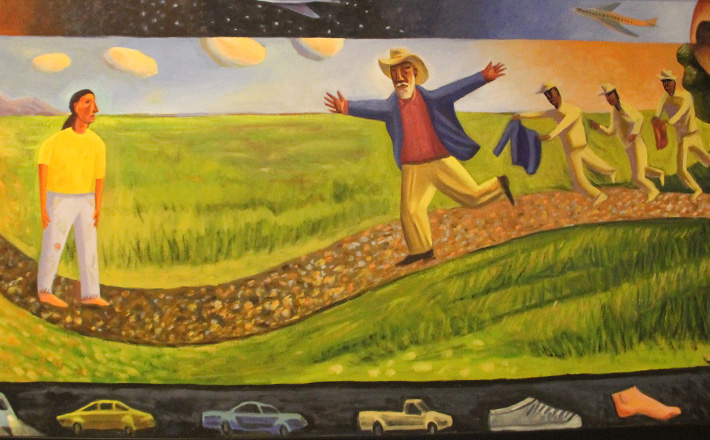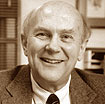Commentary on Psalm 32
The Hebrew Psalter is a marvelous resource for a living response to the God who has created us and redeems us in Jesus Christ.
This Psalm gives us a classic form of confession of sin (verses 2-5) followed by deliverance (verses 6-7). Surrounding this heart of the Psalm is the assurance of joy in the LORD (verse 1), living in the instruction (Torah) of the LORD (verses 8-9), and in the joy of the LORD (verses 10-11).
Herein is our sermon on the text: simply to let the text have its say among those who have come to hear the faithful word of the LORD. We are called to live in the joy of these words and their assurance of forgiveness for those to whom we are called to proclaim the good news: “Happy are those whose transgression is forgiven, whose sin is covered” (verse 1).
End of the Working Preacher response to Psalm 32 for the week! I’m serious! The words that follow the opening verse are so gracious from the psalmist that we could never imagine them on our own.
The translation “happy” to begin the opening verses is not a happy translation for the Hebrew word “‘ashre.” The word expresses the gift of living in a right relationship with God. The prominence of this word at the beginning of the Psalm assures the gift of the right relation for “those whose transgression is forgiven, whose sin is covered” (verse 1). This is the LORD who “imputes no iniquity, and in whose spirit there is no deceit” (verse 2). This is the LORD God in whose presence we are called anew to live in a right relationship.
In fear and trembling in the presence of such a God of majesty, our broken nature keeps silent and our being wastes away “through my groaning all day long” (verse 3). The awesome reality of God stands against us “for day and night your hand was heavy upon me” (verse 4a). There is no escape day and night from such a God who never gives up on us and pursues us with love continually. God’s overpowering strength contrasts with our lack of strength and power on our own to save ourselves from our transgression and sin: “My strength was dried up as by the heat of summer” (verse 4b). There is no place for us to hide from the God who has created us and redeems us.
What turns us from our fear and trembling in the presence of such a God of salvation? “Then I acknowledged my sin to you, and I did not hide my iniquity” (verse 5a). The revealing of our broken and alienated self from God is precisely that which frees us: “I said, ‘I will confess my transgressions to the LORD’, and you forgave the guilt of my sin” (verse 5b). The burden of carrying our own brokenness and alienation from God has been removed; we cannot atone for our own sin and transgression. Only God is able to forgive the creature God has created in his own image.
The “therefore” of verse 6 is a common rhetorical work throughout scripture. It is a little word, but it signals a powerful reversal. The admonition of the psalmist brings us to the all that the preceding verses have expressed: “Therefore let all who are faithful offer prayer to you” (verse 6a). The call to faithfulness is what we need to hear. God has been waiting for our prayer “at a time of distress” that we might live in the assurance that “the rush of mighty waters shall not reach them” (verse 6b).
The one from whom we hide now has become our hiding place. What a reversal! “You are a hiding-place for me; you preserve me from trouble; you surround me with the glad cries of deliverance” (verse 7). The one whom we fear finding us hiding has in fact found us and is the one from whom no one or power can snatch us. We are firmly enfolded in the embrace of our creator and redeeming God.
This is also the God of Torah — “instruction.” The gracious word of God is the promise: “I will instruct you and teach you the way you should go; I will counsel you with my eye upon you” (verse 8). The instructive words of the LORD are true promise. The eye of the LORD is true counsel upon us. What more could we want?
The truth of our humanity is that we are created to hear the instructive word of the LORD, and to see and know the LORD’S eye of counsel and understanding upon us. We have been uniquely fashioned in contrast to the other creatures of God’s creation: “Do not be like a horse or a mule, without understanding.” God does not control us “with bit and bridle,” but with his holy and precious word of grace and assurance of forgiveness. In this word of promise our LORD will “stay near you” (verse 9).
In the world that God so loves and cares for, the power and presence of the adversary remains a force: “Many are the torments of the wicked” (verse 10a). Over and against the wickedness present in our world we live in the hiding place of the LORD from whom no power can snatch us as we live in the promise that God’s “steadfast love surrounds those who trust in the LORD” (verse 10b). In faith we live in God’s promise anew each day.
Because of this assurance the psalmist brings us to the final word of joy which has been carried through these marvelous words of faith. Our identity has been assured in the LORD who is present with us every day, and the psalmist breaks forth in conclusion with words that are emphatic in their placement of all the words of this Psalm: “Be glad in the LORD and rejoice, O righteous” (verse 11a). We are the righteous in the identity that our God has bestowed upon us in Jesus Christ in whose death and resurrection we have been given the gift of God’s righteousness.
For all of this the psalmist calls us to “shout for joy, all you upright in heart” (verse 11b). The gift of Christ’s righteousness has given us the identity of being the “upright.” In this gift of life, even life eternal, our response is as the psalmist proclaims: “Shout for joy!”


March 14, 2010